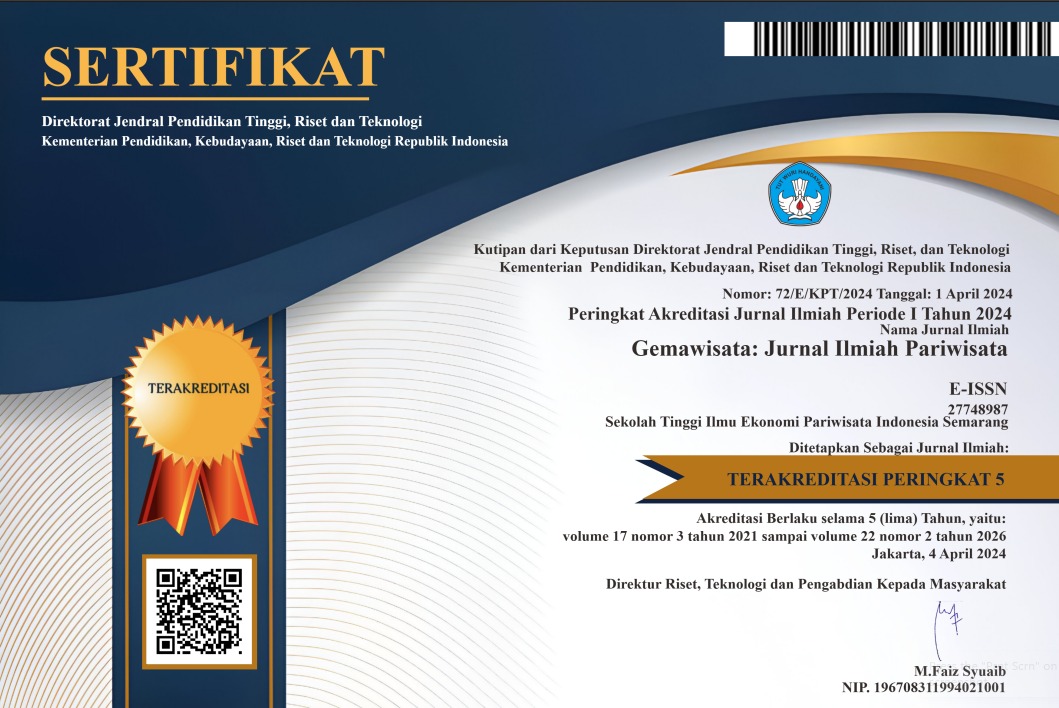Pengelolaan Agroforestri Kopi Berbasis Wisata di Dawuhan Kopi, Kabupaten Semarang
DOI:
https://doi.org/10.56910/gemawisata.v21i2.722Keywords:
Coffee, Coffee Agroforestry, Dawuhan Kopi, Management, TourismAbstract
Tourism is currently a rapidly growing sector, particularly in line with social change and technological advancements. In this context, ecotourism is becoming an increasingly popular approach because it prioritizes the principles of environmental sustainability, local cultural preservation, and improving community welfare. One innovative form of ecotourism is the development of agroforestry-based tourism, which integrates environmentally friendly agricultural and forestry practices. One concrete example of this concept is the Dawuhan Kopi area in Semarang Regency. This area has developed a coffee forest farming system as a primary tourist attraction, aiming to combine nature conservation and community economic development. This study aims to comprehensively examine how coffee agroforestry management in Dawuhan Kopi is implemented as a form of ecotourism and to analyze various optimization efforts that have been and are being implemented. The research method used is a qualitative descriptive approach with data collection techniques such as field observations, in-depth interviews with stakeholders, and documentation. The results reveal that the management of the coffee agroforestry area in Dawuhan Kopi still faces various challenges, particularly in terms of institutional framework, tourism product packaging, availability of supporting facilities, and local community empowerment. To address these issues, a comprehensive improvement strategy is needed, ranging from strengthening institutional capacity, innovation in tourism packages, developing basic infrastructure, and increasing active community participation in every management process. This research is expected to make a positive contribution to the development of a sustainable agroforestry-based ecotourism model and serve as a reference for other regions with similar potential to implement the same concept adaptively and contextually.
References
Astarini, I.A., et al. (2024). Agroforestry based eco-tourism as an innovative solution for economic, environmental and climate resilience in Batur UNESCO Global Geopark, Bali, Indonesia. IOP Conference Series: Earth and Environmental Science, 1315(1), 12011. https://doi.org/10.1088/1755-1315/1315/1/012011
Creswell, J. W., & Poth, C. N. (2016). Qualitative inquiry and research design: Choosing among five approaches (4th ed.). Sage Publications.
Ferdiansyah, L. F. (2025). Partisipasi masyarakat dalam pengelolaan destinasi wisata di Desa Timbanuh, Kecamatan Pringgasela. Jurnal Ilmiah Hospitality, 14(1), 453-460. https://doi.org/10.47492/jih.v14i1.3819
Giampiccoli, A., & Saayman, M. (2018). Community-based tourism development model and community participation. African Journal of Hospitality, Tourism and Leisure, 7(4), 1-27.
Hakim, L. (2021). Agroforestri kopi: Mendorong taman hayati dan wisata kopi. Media Nusa Creative (MNC Publishing).
Hakim, L., et al. (2022). Coffee landscape of Banyuwangi geopark: Ecology, conservation, and sustainable tourism development. Journal of Tropical Life Science, 12(1), 107-116. https://doi.org/10.11594/jtls.12.01.11
Miles, M. B., Huberman, A. M., & Saldana, J. (2014). Qualitative data analysis: A methods sourcebook (3rd ed.). Sage Publications.
Mufarrokhah, C. (2023). Strategi pengembangan agroforestri guna pengembalian fungsi hutan pada ekowisata Permata Hati Kecamatan Wonosalam Kabupaten Jombang. Environmental Pollution Journal, 3(1), 589-599. https://doi.org/10.58954/epj.v3i1.110
Muzaifa, M., et al. (2025). Penerapan model agroforestri kopi dalam mendukung perhutanan sosial di Desa Bah, Aceh Tengah. Repong Damar: Jurnal Pengabdian Kehutanan dan Lingkungan, 4(1), 38-46. https://doi.org/10.23960/rdj.v4i1.11079
Nurrahman, M. I., et al. (2023). Potensi agroforestri kopi untuk wisata alam di Kesatuan Pengelolaan Hutan Lindung Batutegi. MAKILA, 17(2), 197-211. https://doi.org/10.30598/makila.v17i2.10554
Oktoyoki, H., et al. (2024). Financial feasibility study and development of technical specifications for coffee agroforestry for community forest farmers with revolving fund support for productivity optimization. Jendela Pengetahuan, 17(2), 239-251. https://doi.org/10.30598/jp17iss2pp239-251
Patton, M. Q. (2023). Qualitative research & evaluation methods: Integrating theory and practice (4th ed.). Sage Publications.
Plieninger, T., et al. (2020). Agroforestry for sustainable landscape management. Sustainability Science, 15(5), 1255-1266. https://doi.org/10.1007/s11625-020-00836-4
Singh, S., & Singh, G. (2024). Agroforestry for sustainable development: Assessing frameworks to drive agricultural sector growth. Environment, Development and Sustainability, 26(9), 22281-22317. https://doi.org/10.1007/s10668-023-03551-z
Yuliastuti, A. W. (2024). Pengembangan dan kontribusi agroforestri pinus-kopi pada aspek ekonomi, sosial, dan lingkungan di BKPH Candiroto Perum Perhutani KPH Kedu Utara. Universitas Gadjah Mada. https://doi.org/10.59465/jppdas.2024.8.1.93-112
Zabala, A., et al. (2025). Drivers to adopt agroforestry and sustainable land-use innovations: A review and framework for policy. Land Use Policy, 151, 107468. https://doi.org/10.1016/j.landusepol.2025.107468


1_(1).jpg)






